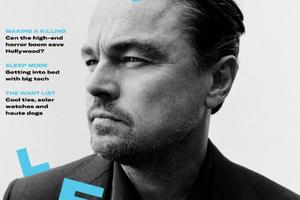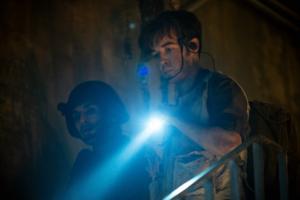Entertainment
/ArcaMax

Justin Bieber says he 'doesn't deserve forgiveness'
Justin Bieber receives "forgiveness and love" that he "truly [doesn't] deserve".
The 31-year-old pop star has taken to social media to open up about his faith, revealing that he "wouldn't be able" to get through the day without love from Jesus.
Justin - who is married to model Hailey Bieber - wrote on Instagram: "grateful for a new day.
"...Read more

Leonardo DiCaprio 'has a desire to be more honest'
Leonardo DiCaprio is keen to be "more honest" after turning 50.
The Hollywood star celebrated his landmark birthday in November 2024, and he admits that it's prompted a change in attitude.
Speaking to Esquire UK, the movie star explained: "It [turning 50] creates a feeling like you have a desire to just be more honest and not waste your time. ...Read more

Teddi Mellencamp 'can't reveal Real Housewives salary'
Teddi Mellencamp isn't allowed to reveal her Real Housewives salary.
The 44-year-old reality star was a cast member on The Real Housewives of Beverly Hills between 2017 and 2020, but Teddi was always discouraged from discussing her salary.
During an appearance on The Jamie Kern Lima Show podcast, Teddi explained: "The longer that you're on The...Read more

Developing 'Alien: Earth' was all about building suspense -- and getting Easter eggs right
Here’s what one might expect from a series rooted in the “Alien” universe: dimly lit spaceship corridors, sleeping pods, computer screens, something slithering in the shadows and, of course, lots and lots of blood.
Here’s what you don’t expect: lore from “Peter Pan.”
But then FX’s “Alien: Earth” was created by Noah Hawley, ...Read more

Q&A: Daniel Dae Kim hopes 'Butterfly' can be the 'KPop Demon Hunters' of spy thrillers
"Butterfly" is actor and producer Daniel Dae Kim's love letter to Korea and America.
Launching Wednesday, Prime Video's South Korea-set spy thriller follows David Jung (Kim), a former U.S. intelligence operative who comes out of hiding to reunite with his daughter Rebecca (Reina Hardesty), a deadly agent who grew up believing he was dead.
"It'...Read more

Rapper, YouTuber DDG briefly detained in SoCal, possible victim of swatting incident
LOS ANGELES — A popular YouTube streamer posted on social media that he "almost [died] today" after Los Angeles County Sheriff's Department deputies drew their weapons on him and briefly detained him Sunday afternoon in what he said appears to be a swatting incident.
Rapper DDG posted on a YouTube video that he was at a paintball tournament ...Read more

Jennifer Aniston 'fought for her Horrible Bosses wig'
Jennifer Aniston "fought" to wear a wig in Horrible Bosses.
The 56-year-old actress played the flirtatious Dr. Julia Harris in the 2011 comedy movie, and Jennifer has revealed that her brunette wig was a point of contention before the cameras started rolling.
The Hollywood star told Vanity Fair: "I fought for that wig, by the way. That was not...Read more

'Means the world': Sharon Stone grows emotional over Eric Dane's Euphoria role
Sharon Stone says Eric Dane's role in Euphoria "means the world" to her.
The 67-year-old actress has landed a mysterious role in the upcoming third season of the HBO drama and she is delighted to be starring alongside her old friend - who announced in April that he is battling the incurable degenerative condition ALS - because she knew how much...Read more

Denzel Washington wishes he had 'prayed more'
Denzel Washington wishes he'd been more active in his faith when he was younger.
The 70-year-old actor - who was baptized and obtained a minister license last year - has enjoyed a long and successful career and the only advice he has to offer his younger self is to have been more in contact with God.
Asked the advice he'd give a younger Denzel...Read more

Friday the 13th legend Kane Hodder nearly played Freddy Krueger in A Nightmare On Elm Street
Friday the 13th franchise star Kane Hodder almost landed the role of Freddy Krueger in A Nightmare On Elm Street.
The 70-year-old actor was the man behind the hockey mask playing killer Jason Voorhees in four films; Friday the 13th Part VII: The New Blood, Friday the 13th Part VIII: Jason Takes Manhattan, Jason Goes to Hell: The Final Friday ...Read more

New Addams Family animated feature film being developed
Wednesday creators Alfred Gough and Miles Millar are creating a new animated Addams Family feature film.
The two showrunners of the Netflix series are developing an Addams Family reboot for Amazon MGM Studios which will be unconnected to Wednesday - which stars Jenna Ortega as Wednesday Addams - and the previous two animated films released in ...Read more

'Don't be fooled': Crowded House dispel fake AI news that frontman Neil Finn suffers from erectile dysfunction
Crowded House have shot down a false AI-generated report claiming frontman Neil Finn suffers from erectile dysfunction.
In the bizarre clip, TVNZ journalist Simon Dallow reports on the fake news that the Don't Dream It's Over hitmaker has recently had a child after struggling with impotence.
An AI version of Finn says in the broadcast: "I ...Read more

Eddie Van Halen's custom Kramer guitar could fetch $2 to $3m at auction
Eddie Van Halen's electric guitar is predicted to fetch between $2 and $3 million at auction.
The custom 1982 Kramer once belonging to the late Van Halen axe-slayer - who died in 2020, at the age of 65, following a battle with throat cancer - will go under the hammer as part of Sotheby's New York's all-new Grails Week commencing on October 21. ...Read more

Demi Lovato found Jonas Brothers surprise performance 'healing'
Demi Lovato found it "really healing" to perform with the Jonas Brothers over the weekend.
The 32-year-old singer-and-actress made a surprise appearance at her Camp Rock co-stars' show in New Jersey on Sunday (10.08.25) and not only was it "so nice" to be back on stage with the trio after receiving a call from ex-boyfriend Joe Jonas, they ...Read more

Jason Momoa came close to death in surfing accident
Jason Momoa almost drowned while out surfing.
The Aquaman actor was navigating Pe'ahi, the biggest surf break in Maui, which is nicknamed Jaws, during a lengthy paddle through Hawaiian waters in 2007 when his leg rope snapped amid high wind, though he was "fine" at first, despite the waves crashing down on him.
Speaking on the Smartless ...Read more

Jessie J's hair 'is falling out like crazy'
Jessie J's hair was falling out "like crazy" after she underwent surgery.
The 37-year-old pop star underwent a mastectomy in June, after being diagnosed with breast cancer, and in a video filmed two weeks ago, Jessie revealed the physical toll of her surgery.
In a video posted on Instagram, and filmed before a TV show appearance, Jessie ...Read more

Brittany Cartwright sheds tears on Special Forces: World's Toughest Test
Brittany Cartwright cried "at least three times" on Special Forces: World's Toughest Test.
The 36-year-old reality star appears on season four of Special Forces, the quasi-military training TV series, and Brittany has described competing on the show as the "hardest thing" she's ever done.
During an appearance on the Detox Retox With Tom ...Read more

Rapper Jeezy takes 10-hour Uber ride to make Baltimore concert after flights canceled
BALTIMORE — Atlanta-based rapper Jeezy would have missed his Baltimore concert at The Lyric if not for an Uber driver willing to drive him 10 hours to Charm City.
According to an Instagram post, Jeezy woke up before his Baltimore show on Aug. 1 to find that all flights to Baltimore and D.C. had been canceled due to weather.
His team arranged...Read more

How a lavish celebrity wedding brought Good Charlotte back together
As rock-band relaunches go, Good Charlotte's was conspicuously ritzy.
In April 2023, the pop-punk group known for snotty if smiley Y2K-era hits like "The Anthem" and "Lifestyles of the Rich and Famous" — "I'd like to see them spend a week / Livin' life out on the street," goes a lyric in the latter — played its first gig in four years not ...Read more

Sound Advice: Open-back headphones with luxurious comfort come at a price
Q. I love the sound of my open-back Grado headphones, but in my old age (55) I am over the constantly twisted cables and overall discomfort. I am not interested in Sennheisers as they sound completely muted to me. Do you have any suggestions for great-sounding headphones that are more luxurious in comfort and overall experience than my Grados, ...Read more











